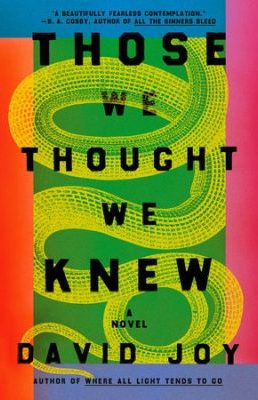“What happens when the people you’ve always known turn out to be monsters, what do you do when everything you ever believed crumbles away?”
David Joy’s Those We Thought We Knew follows a young Black artist from Atlanta named Toya who returns to her home in the Appalachian Mountains in order to trace her history and unveil the systemic bigotry present even in the most unexpected people.
Through alternating perspectives throughout the novel, the reader gets to know, and ultimately trust, the inhabitants of Sylva, North Carolina. Some of the more significant characters include Sheriff John Coggins, the upstanding yet proud pillar of law enforcement and long-time friend of Toya’s grandfather; detective Leah Green, who appears later in the novel to solve one of its tragic crimes; and my personal favorite, Vess, Toya’s anxiously devoted grandmother. The reader slowly learns about the story’s events through the independent knowledge and experiences of each character. However, we additionally get to feel sympathetic toward or even betrayed by some of them in a way that mirrors how the characters feel about one another.
The novel’s Southern mountainous setting is brimful with Confederate monuments, corrupted government officials, and hatred-driven cults many would expect to accompany a small, rural community in the South. Whether the reader has been a part of these communities themselves, or identifies with Toya’s perspective on the community as an outsider, Joy allows everyone to be enveloped in the dynamics of this town. I got a clear mental image of each character while reading—their appearance, their voice, and their personality—as if I know them myself.
The conversations regarding racism between the characters are one of the novel’s most prevalent elements. The subject matter of this dialogue felt very pertinent to me, especially in the wake of the Black Lives Matter movement. These conversations certainly include the same stereotypical phrases we’d expect to hear (from every side), but never quite feel trite. These overt conversations lay the foundation for the novel’s later events, conflicts, and mysteries, as the reader can still hear the echoes of each character’s words in their heads as new twists and turns are uncovered. Even weeks after having finished this novel, I still hear Joy’s words echoing in my own head.
Those We Thought We Knew balances a suspenseful mystery with a fast-paced, action-packed crime story. Even after the appropriately jarring revelation at its midpoint, the novel captivated me in a way that is often difficult to find in slow-burn mysteries. It’s certainly a “can’t put it down” kind of book, but has enough thought-provoking substance that made me want to slow down, re-read, and reference back to clues I’d missed. Joy’s ability to invoke understanding for all of his primary characters makes for an engaging read, no matter what perspective or character you may find yourself enjoying or aligning with most.
It’s certainly compelling to read a crime novel that is so unequivocally timely to our modern political sphere. As my first experience with David Joy’s novels, I was thankful for my investment in Those We Thought We Knew and plan to read his future works. I hope Joy’s book helps open up an increasingly more open-minded, diverse space within the genre of Southern noir.
Rating: 4 of 5 stars

